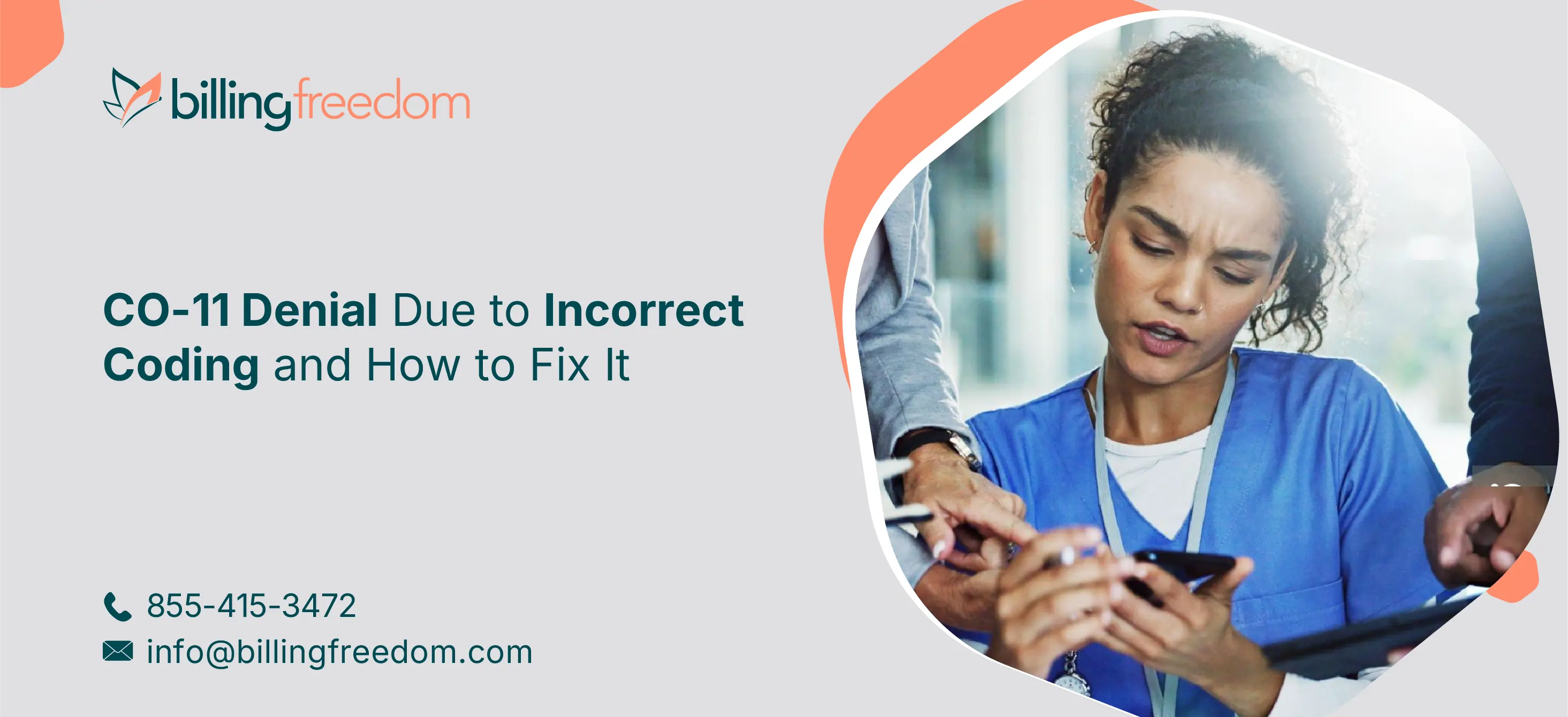
When a claim is denied under CO-11, it signals a coding issue that prevents the payer from processing the service correctly. This type of denial usually arises when the submitted codes do not align with documented services or fail to meet payer requirements. Understanding why CO-11 occurs and how to correct it is essential for maintaining clean claims, ensuring compliance, and protecting reimbursement.
What CO-11 Means
A CO-11 denial signals that the claim contains coding errors that conflict with documentation or payer expectations. This may include wrong code selection, unsupported diagnosis-to-procedure relationships, outdated or deleted codes, or incompatible coding combinations. To avoid CO-11, coding must precisely match the documented clinical service and meet payer-specific criteria.
Common Reasons for CO-11
- Incorrect procedure or diagnosis code selected
- Documentation does not support the codes billed
- Code violates payer policy
- Unbundled, outdated, or non-billable code submitted
Why CO-11 Denials Occur
CO-11 denials arise when coding does not accurately reflect the documented service or fails to meet payer rules. These issues interrupt proper claim adjudication and often stem from avoidable oversights. The following are the most common causes behind CO-11 denials and why they occur:
Incorrect code selection
This happens when the CPT, HCPCS, or ICD code chosen does not appropriately describe the documented service, diagnosis, or procedure. Even minor inaccuracies, such as selecting a similar but incorrect code, can lead to payer confusion and claim rejection.
Documentation mismatch
A claim will be denied when the provider documentation fails to support the codes billed. Missing details, insufficient clinical descriptions, or inconsistencies between documentation and coding all signal to the payer that the service was inaccurately represented.
Use of outdated, deleted, or non-billable codes
Code sets are updated annually, and submitting deleted, replaced, or non-covered codes directly triggers CO-11. Payers reject these claims because the codes no longer meet current billing standards or are not recognized in their systems.
Unbundling errors
Submitting separate codes for services that should be billed under one comprehensive code violates NCCI guidelines. Unbundling is monitored strictly because it can be perceived as overbilling, making it a frequent cause of CO-11 denials.
Violations of payer-specific coding rules
Payer policies differ widely. Some require specific diagnosis-to-procedure pairings, additional documentation, or the use of certain modifiers. When these criteria are not met, the payer concludes the coding is incorrect, even if the clinical service was valid.
CMS & AAPC-Aligned Best Practices To Prevent Denial Under CO-11
Preventing CO-11 denials requires coders and billers to follow consistent, compliant processes that ensure every code aligns with documentation and payer requirements. The best practices below support accurate claim submission and reduce the risk of incorrect coding errors.
Review payer-specific coding and documentation guidelines
Payers often interpret coding rules differently, and some require specific diagnosis codes, modifiers, or documentation elements for certain procedures. Regularly reviewing these guidelines ensures the codes you submit meet the payer’s workflow and reduce denials stemming from policy conflicts.
Ensure documentation fully supports the services reported
Coding must be grounded in precise and complete provider documentation. Detailed notes eliminate ambiguity, support the medical necessity of the service, and validate the codes selected. When documentation and coding align, payers can adjudicate the claim without requesting clarifications or issuing denials.
Validate code accuracy using updated codebooks and encoder tools
Using outdated code sets or relying on memory increases the risk of selecting incorrect or inactive codes. Updated codebooks and encoder tools provide real-time guidance, helping coders choose the most accurate and compliant codes based on the current year’s updates.
Use NCCI edits and MUE guidance to avoid incompatible code combinations
NCCI edits help prevent unbundling and code-pairing errors, while MUE guidance identifies quantity limits or medically unlikely combinations. Running claims through these checks ensures that code combinations reflect accepted billing standards and reduces errors before submission.
Maintain coder training and internal audits
Coding guidelines evolve regularly, and ongoing education ensures coders stay current with industry standards. Internal audits reveal patterns of coding inaccuracies, highlight areas needing improvement, and support corrective action. A well-trained team and strong audit process are essential for long-term denial reduction.
BillingFreedom Your Billing Partner For Accurate Coding & Denial Prevention Support
BillingFreedom offers specialized coding and RCM solutions that eliminate costly errors, such as CO-11. Our certified coders ensure every claim aligns with payer policies, documentation requirements, and national coding standards.
Through detailed audits, real-time accuracy checks, and specialty-specific coding expertise, we help practices significantly reduce incorrect-coding denials and maintain smoother billing operations.
With proactive claim reviews, clean-claim optimization, and fast correction workflows, BillingFreedom strengthens your entire revenue cycle. Our team ensures claims are coded correctly the first time, while our analytics tools help identify recurring issues before they impact revenue.
Partnering with us provides practices with confidence in compliant coding, higher reimbursement rates, and fewer delays, ultimately resulting in a more stable financial foundation.
For more details about our exceptional medical billing services, please don't hesitate to contact us via email at info@billingfreedom.com or call us at +1 (855) 415-3472.
Your financial tranquility is our priority!
Let's Get in Touch
Please fill up the form, one of our AAPC certified medical biller and coder will reach out to you.




